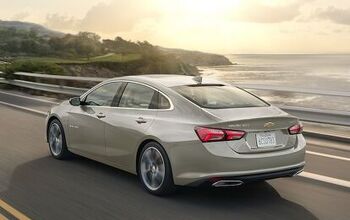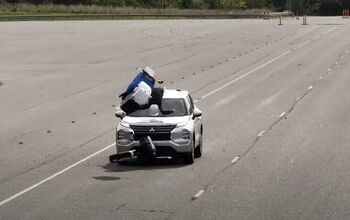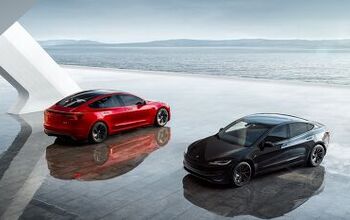Driving Dystopia: Judge Dismisses Automotive Privacy Lawsuit

Last week, a federal judge refused to have the courts reexamine a gaggle of class action lawsuits claiming automotive manufacturers had violated Washington State's privacy laws after allegations that on-board infotainment systems were recording customers’ private text messages and mobile phone call logs. Despite substantial evidence that the above claims are not only true but also just the tip of the iceberg as manufacturers have normalized some of the most egregious data harvesting we’ve seen, the Seattle-based judge said the allegations were not severe enough to be considered a violation of the Washington Privacy Act (WPA).
The plaintiffs represent a series of class actions suits asserting that vehicles sold by Ford, Honda, General Motors, Toyota, and Volkswagen have “recorded and intercepted [owners’] private text messages and call logs.”
Despite years of the industry downplaying data harvesting as simple telematics analysis that can be used to help troubleshoot designs and establish better maintenance routines, it has been revealed that modern automobiles likely have the worst user privacy practices imaginable. In many cases they’re even worse than smartphones, because the first thing the car does is yank as much data off your mobile device as it can once they’ve been paired together.
While the Mozilla Foundation study from earlier this year helped make that clear to a wider audience, savvy consumers were already coming to the realization that automotive connectivity had allowed companies to track everything from the vehicle’s current position, HVAC settings, speed, and what was playing over the speakers, to just about everything that’s been stored on a person’s phone. Automotive-focused apps have only worsened the issue, as they frequently utilize the kind of implicit user agreements nobody reads but ultimately results in a forfeiture of privacy.
Much of that data is useful to the manufacturer for marketing and development purposes. But we’ve also seen data being sold off to third parties while the technology continues getting more invasive and drivers rarely have any say in the matter. Unfortunately, when you tell someone about this there’s still a chance they’ll furrow their brow and call you paranoid.
"Cars seem to have really flown under the privacy radar and I'm really hoping that we can help remedy that because they are truly awful," said Jen Caltrider, who conducted research for the Mozilla Foundation study. "Cars have microphones and people have all kinds of sensitive conversations in them. Cars have cameras that face inward and outward."
The relevant lawsuits don’t dig that deeply, however. They were focused primarily on the phone data vehicles will relay back to the manufacturer. According to The Record, the case against Ford had been dismissed on appeal previously. The plaintiffs in the four other cases had appealed a prior judge’s dismissal. But the appellate judge ruled that the Washington Privacy Act requires plaintiffs to prove that “his or her business, his or her person, or his or her reputation” has been threatened.
It’s not clear what it’s going to take to move the needle on the privacy issue. Despite numerous states implementing laws designed to keep tech companies from spying on users, there hasn’t been much formal regulatory pushback. Meanwhile, automakers and companies selling “smart devices” are having customers pay real money for physical products that are effectively spying on them. Car companies have likewise integrated things like Amazon's Alexa into newer vehicles, even though there have been sustained concerns that the service is highly questionable in regard to maintaining user privacy.
Automakers have spent the last several years building massive data hubs to store and analyze the staggering amount of information being gathered by today’s vehicles. But they’re not the only interested parties, everyone from your insurance agency to your satellite radio provider is trying to finagle at least some information out of cars. And data brokers will happily make deals with any other entity that's offering them money.
From The Record:
In an example of the issues at stake, plaintiffs in one of the five cases filed suit against Honda in 2021, arguing that beginning in at least 2014 infotainment systems in the company’s vehicles began downloading and storing a copy of all text messages on smartphones when they were connected to the system.
An Annapolis, Maryland-based company, Berla Corporation, provides the technology to some car manufacturers but does not offer it to the general public, the lawsuit said. Once messages are downloaded, Berla’s software makes it impossible for vehicle owners to access their communications and call logs but does provide law enforcement with access, the lawsuit said.
Many car manufacturers are selling car owners’ data to advertisers as a revenue boosting tactic, according to earlier reporting by Recorded Future News. Automakers are exponentially increasing the number of sensors they place in their cars every year with little regulation of the practice.
U.S. lawmakers may be threatening to take action against the collection, transfer, and sale of user data. But little has been done to directly combat the issue. Legislators seem to have little understanding of the matter, with the brunt of their information coming from industry lobbyists, and the courts don’t seem much better.
But we’re also butting up against U.S. regulations that could be broadly interpreted to mandate things like in-cabin camera systems and permanent driver monitoring by 2026. The European Union has implemented even stricter protocols within the same timeframe, despite also having conflicting privacy laws in place.
There is some reason to be hopeful, however. Despite the Washington cases being dismissed, they were civil suits and that usually comes with the assumption that the plaintiff has to incur damages for things to move forward. While your author would argue unwittingly paying tens of thousands of dollars for a device that spies on you absolutely qualifies, the judge may simply believe that the matter isn’t quantifiable. A non-civil suit, where plaintiffs reached out to the Attorney General to address broader consumer protections and the possibility of illegal business practices may have better luck.
The public is also growing more aware of the issue. When automakers began harvesting user data in the early 2010s, the people were more focused on evidence that the National Security Agency has been illegally spying on American citizens and how social media companies were becoming too big for their britches. Claims that automobiles were harvesting scads of user data were frequently laughed off and ultimately fell by the wayside.
That’s not the case today. While full awareness of the problem remains lower than it probably should, more motorists are becoming hip to the situation and we’ve started seeing the issue being taken on by consumer advocacy groups. The right-to-repair movement has also called into question data ownership rights and is fighting for legislation that at least provides drivers with the ability to control some of their data.
The road ahead still looks long and rough for those who value privacy. However, headway is slowly being made and laying the groundwork for real change. Just don’t expect the relevant companies to lay back and submit, as vehicle data harvesting is assumed to be an industry worth hundreds of billions of dollars annually.
[Image: General Motors]
Become a TTAC insider. Get the latest news, features, TTAC takes, and everything else that gets to the truth about cars first by subscribing to our newsletter.

A staunch consumer advocate tracking industry trends and regulation. Before joining TTAC, Matt spent a decade working for marketing and research firms based in NYC. Clients included several of the world’s largest automakers, global tire brands, and aftermarket part suppliers. Dissatisfied with the corporate world and resentful of having to wear suits everyday, he pivoted to writing about cars. Since then, that man has become an ardent supporter of the right-to-repair movement, been interviewed on the auto industry by national radio broadcasts, driven more rental cars than anyone ever should, participated in amateur rallying events, and received the requisite minimum training as sanctioned by the SCCA. Handy with a wrench, Matt grew up surrounded by Detroit auto workers and managed to get a pizza delivery job before he was legally eligible. He later found himself driving box trucks through Manhattan, guaranteeing future sympathy for actual truckers. He continues to conduct research pertaining to the automotive sector as an independent contractor and has since moved back to his native Michigan, closer to where the cars are born. A contrarian, Matt claims to prefer understeer — stating that front and all-wheel drive vehicles cater best to his driving style.
More by Matt Posky
Latest Car Reviews
Read moreLatest Product Reviews
Read moreRecent Comments
- NJRide A question and a point:1) What were hybrids at compared to last year? And plug in bs a regular hybrid?2) How can state governments like mine possibly think 40 percent of sales will be electric in 3 years?
- Steve S. Steve was a car guy. In his younger years he owned a couple of European cars that drained his bank account but looked great and were fun to drive while doing it. This was not a problem when he was working at a good paying job at an aerospace company that supplied the likes of Boeing and Lockheed-Martin, but after he was laid off he had to work a number of crummy temp jobs in order to keep paying the rent, and after his high-mileage BMW was totaled in an accident, he took the insurance payout and decided to get something a little less high maintenance. But what to get? A Volkswagen? Maybe a Volvo? No, he knew that the parts for those were just as expensive and they had the same reputation for spending a lot of time in the shop as any other European make. Steve was sick and tired of driving down that road."Just give me four wheels and a seat," said Steve to himself. "I'll buy something cooler later when my work situation improves".His insurance company was about to stop paying for the rental car he was driving, so he had to make a decision in a hurry. He was not really a fan of domestics but he knew that they were generally reliable and were cheap to fix when they did break, so he decided to go to the nearest dealership and throw a dart at something.On the lot was a two year old Pontiac Sunfire. It had 38,000 miles on it and was clean inside and out. It looked reasonably sporty, and Steve knew that GM had been producing the J-car for so long that they pretty much worked the bugs out of it. After taking a test drive and deciding that the Ecotec engine made adequate power he made a deal. The insurance check paid for about half of it, and he financed the rest at a decent rate which he paid off within a year.Steve's luck took a turn for the better when he was offered a job working for the federal government. It had been months since he went on the government jobs website and threw darts at job listings, so he was surprised at the offer. It was far from his dream job, and it didn't pay a lot, but it was stable and had good benefits. It was the "four wheels and a seat" of jobs. "I can do this temporarily while I find a better job", he told himself.But the year 2007 saw the worst economic crash since the Great Depression. Millions of people were losing their jobs, the housing market was in a free fall, people were declaring bankruptcy left and right, and the temporary job began to look more and more permanent. Steve didn't like his job, and he hated his supervisors, but he considered himself lucky that he was working when so many people were not. And the federal government didn't lay people off.So he settled in for the long haul. That meant keeping the Sunfire. He didn't enjoy it, but he didn't hate it either, and it did everything he asked of it without complaint.Eventually he found a way to tolerate his job too, and he built seniority while paying off his debts. There was a certain feeling of comfort and satisfaction of being debt-free, and he even began to build some savings, which was increasingly important for someone now in their forties.Another bit of luck came a few years later when Steve's landlord decided to sell the house Steve was renting, at the bottom of the housing market, and offered it to Steve for what he had in it. Steve's house was small and cramped, and he didn't really like it, but thanks to his savings and good credit he became a homeowner in an up and coming neighborhood.Fourteen years later Steve was still working that temporary job, still living in that cramped little house that he now hated, and still drove the Sunfire because it wouldn't die. For years now he dreamed of making a change, but then the pandemic happened and threw the economy and life in general into chaos. Steve weathered the pandemic, kept his job when millions of people were losing theirs, and sheltered in place in that crummy little house, with Netflix, HBO, and a dozen other streaming services keeping him company, and drove to and from work in the Sunfire because it was four wheels and a seat and that's all he needed for now.Steve's life was secure, but a kind of dullness had set in. He existed, but the fire went out; even when the pandemic ended and life returned to normal Steve's life went on as it had for years; an endless Groundhog Day of work, home, work, home. He never got his real-estate license or finished college and got his bachelor's, never got a better job, never used his passport to do some traveling in Europe. He lost interest in cars. "To think how much money I wasted on hot cars when I was younger", he said to himself. He never married and lost interest in dating. "No woman would want me anyway. I've gotten so dull and uninteresting that I even bore myself".Eventually the Sunfire began to give trouble. With 200,000 miles on the clock it was leaking oil, developing electrical gremlins, and wallow around on blown-out shocks. Steve wasn't hurting for money and thought about treating himself to a new car. "A BMW 3-series, maybe. Or maybe an Alfa Romeo Giulia!" He began to peruse the listings on Autotrader. "Maybe this is just what I need to pull out of this funk. Put a little fun back in my life. Yeah, and maybe go back to the gym, and who knows, start dating again and do some traveling while I'm still young enough to enjoy it!"Then his father passed away and left him a low-mileage Ford. Steve didn't like it or hate it, but it was four wheels and a seat, and that's all he needed right now."Is it too late to have a mid-life crisis?" Steve thought to himself. For what he needed more than that stable job, that house with an enviably small mortgage payment, and that reliable car was a good kick in the hindquarters. "What the hell am I afraid of? I should be afraid that things will never change!"But the depression was like a drug, a numbness that they call "dysthymia"; where you're neither here or there, alive or dead, happy or sad. It was a persistent overcast, a low ceiling that kept him grounded. The Sunfire sat in his driveway getting buried by the needles from his neighbor's overhanging pine trees which were planted right on the property line. "Those f---ing pine trees! That's another thing I hate about this damn house!" Eventually the Sunfire wouldn't start. "I don't blame you", he said to the car as he trudged past it to drive the Ford to another Groundhog Day at that miserable job.
- Yuda Cool. Cept we need oil and such products. Not just for fuel but other stuff as well. The world isn't exactly ready to move to wind and solar and whatever other bs, the technology simply isn't here yetNot to mention it's too friggin expensive, the equipment is still too niche and expensive as it stands
- Rna65689660 Picked up my wife’s 2024 Bronco Sport Bad Lands!
- Inside Looking Out Android too.


































Comments
Join the conversation
I'm safe - I think. Since retirement, I no longer own anything newer than 2005.
You’d really have to be gullible to think the inside camera is a feature.